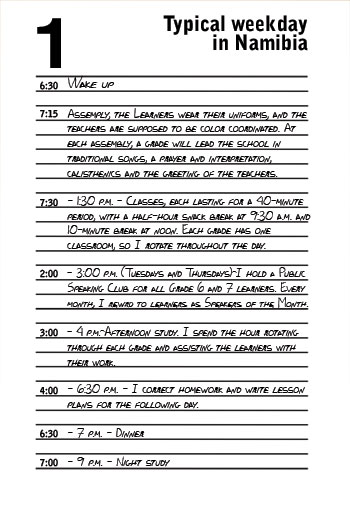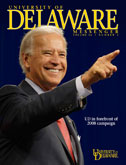
Alumni | As 2008 draws to a close, Kathryn Martorana, AS ’07, is wrapping up a year of teaching in the southern African nation of Namibia through the organization World Teach. Here is some of what she says about her experience:
World Teach (WT) is an independent, nonprofit organization based at the Center for International Development at Harvard University, which provides participants with the opportunity to contribute to international education by working as volunteers in a developing country. WT operates around the globe.

Arriving in Windhoek [the capital of Namibia] with other volunteers on Dec. 30, 2007, we quickly began our orientation program. During the month of January, my WT group participated in a rigorous schedule of teacher, language, cultural and security training.
Currently, I am teaching at Lano Primary School, a private boarding school in Onayena. Onayena is a small town, approximately 50 miles south of the Angolan border. In addition to the school, it consists of a few markets, a secondary school, a post office, a new clinic, a police station and various homesteads.
I am teaching grades five through seven English and grade seven math. My learners (Namibians use the term “learner” for any child up to secondary school and “student” for a person at university) are very bright and diligent. At Lano, English is the language of instruction, unlike most government schools.
Being a private school, Lano has more resources at its disposal than most government schools. Yet, the school does lack resources that I find essential for a quality education. First, there is no computer lab, which puts the learners at a disadvantage when entering secondary school. Secondly, the library consists of just two bookshelves. I have been working to acquire grants to fund a computer lab and additional books.
On weekdays, I’m kept busy with teaching and other school activities. (See my schedule on next page.) During the weekends, I usually stay at my site for one night because I am in charge of entertainment for the hostel learners (watching a movie or reading a story, for example). During the remaining night, I visit other WT volunteers. Most of the volunteers are placed in northern Namibia. There are 12 in the north, five of them within two hours of my placement. Besides them, I rarely come in contact with foreigners.
My presence always draws attention, which has been an adjustment. Fortunately, the United States is viewed positively in Namibia, which can be attributed to the U.S. Agency for International Development’s strong presence in the country. As a result, when Namibians recognize that I am American and not German (Namibia’s former colonizer), I am treated with kindness.
My living conditions are different but manageable for my circumstance. I live in a teachers building on the school property. I have my own room with a full-size refrigerator, a mini-oven/hot plate, a table, shelves, a window and a bed. In the summer, when there are more malaria-carrying mosquitoes, I have a bed net for protection. The teachers share a common kitchen, which consists of a hot plate, a sink and an oven. Since I’ve been here, the oven has been broken. There is a common shower and bathroom but no hot water. Additionally, I have a bucket in my room for washing clothes and a clothesline outside for drying.
Keeping a flashlight in my room is a must, due to the frequent power shortages. Lano Primary School has very limited Internet access, so I usually only check my e-mail once a week. Fortunately, there is excellent cell phone service in Namibia, so my family and friends are able to contact me on a regular basis.
Traveling to other African countries is a perk of working in Namibia. We had a three-week break in April, a two-week break in August, and then I will have the entire month of December to travel before I return to the United States.
The most rewarding part of my experience has been the connections I’ve made with the children. Teaching in Namibia has been both inspiring and heartbreaking. I have become a teacher, mother and nurse to my learners, and I am constantly amazed at their determination and resilience toward gaining an education. Additionally, it is interesting to have studied the history and present-day politics of southern Africa and to come and live in the region of study. Namibia, having liberated itself of German colonizers in 1914 and gained independence from South Africa in 1991, is still struggling to fully embrace a system of democracy.
At UD, I was an international relations major with a minor in economics. During my freshman year, I participated in UD’s South Africa Winter Session program. Experiencing South Africa catalyzed my interest in my course of study.
Now, with World Teach, living and working for 12 months in a foreign country is an experience that few receive and many wish they had. Mark Twain put it nicely when he wrote, “Broad, wholesome, charitable views of men and things cannot be acquired by vegetating in one little corner of the Earth all one’s lifetime.”





